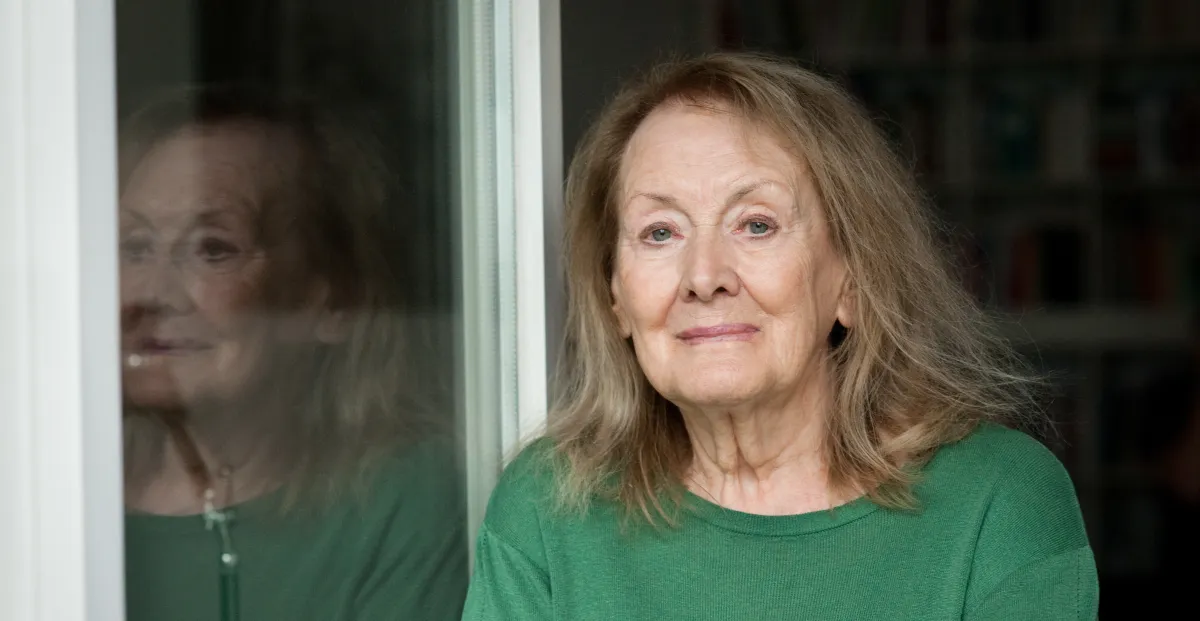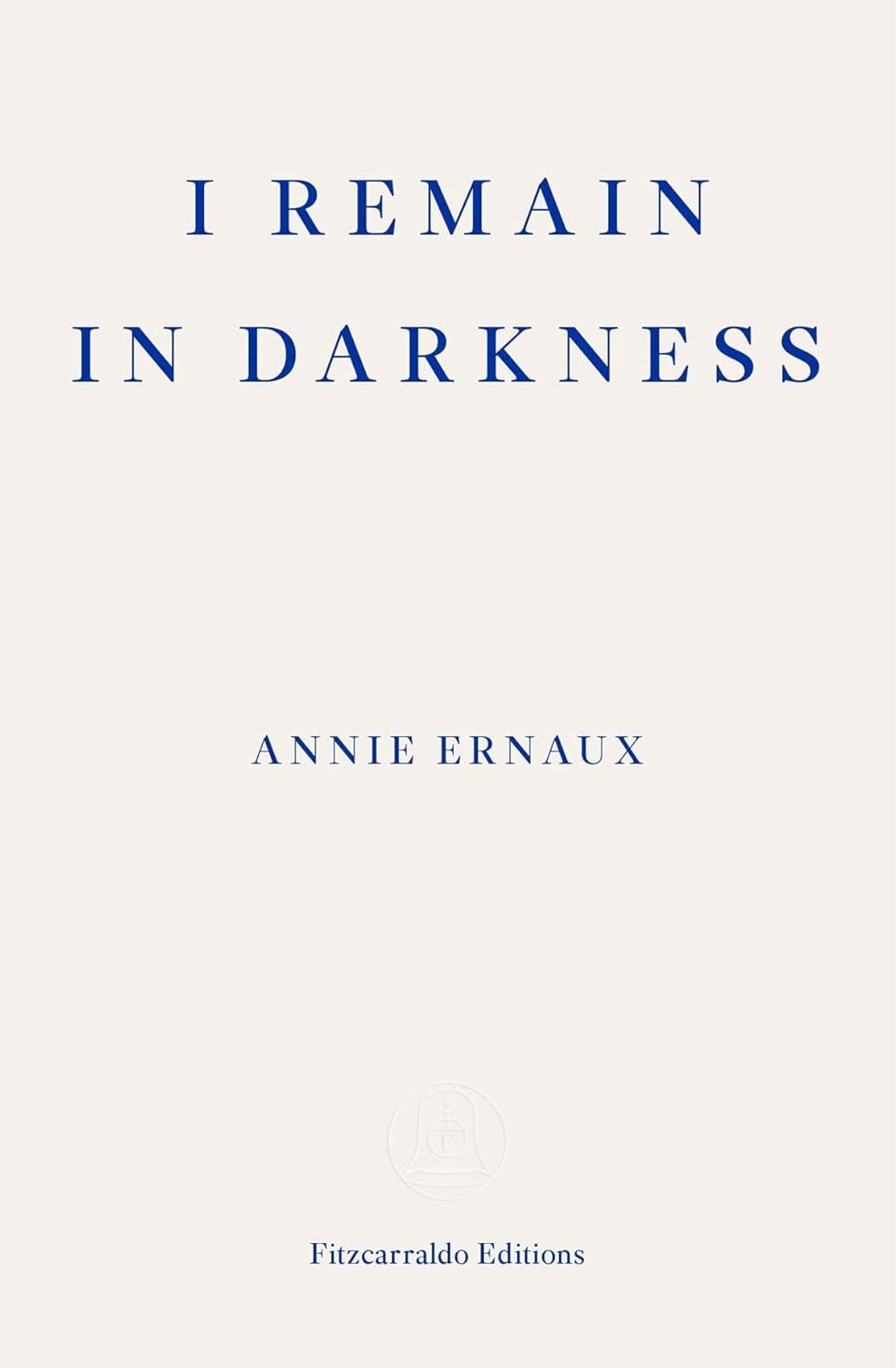Writing while disappearing

 Fitzcarraldo Editions
Fitzcarraldo EditionsAnnie Ernaux | I Remain in Darkness | Fitzcarraldo Editions | 80 pages | 9,99 GBP
The line that Annie Ernaux draws cannot simply be crossed; this review must first write about it, just as one encounters it while reading her story "I Remain in Darkness” which has finally been translated into German. What do neoliberalism and Annie Ernaux have in common? A strange juxtaposition given that, in her acceptance speech for the Nobel Prize for Literature, before serried ranks of suits and ties, the author spoke of her writing as class revenge. She meant the working class, of course. The ego in her writing has a system; for her, class is the description of an existing social order. Her writing takes place within this order, and thus necessarily also in discussion of it. In her speech, she describes her approach to her texts as deciphering and emancipating. And on the first pages, she draws this line: "Under no circumstances should these pages be [read] as an objective report on care or even as an indictment, they are simply the remnants of pain. “l Remain in Darkness" tells the story of her own mother's dementia. 'Nothing more?’ she asks.
From the very start, the reader is faced with a limit, namely how to read the text. They should not read it as a report or as an indictment. They should not relate it to a demographically ageing society that is simultaneously shying away from death, a fact already evident in the nursing crisis and shortage of skilled workers. The story of her mother's dementia and care marks the preceding note as not only an individual but also a private experience. The disappearance of her own mother into oblivion, into her dementia, should remain the pain of an ego that states elsewhere in the text: "Literature can do nothing".
Where Annie Ernaux previously used footnotes to contextualise her own shame regarding her sociological or historical origins, describing herself as an ethnographer of herself, at first glance this text singles out her mother's illness, as only neoliberalism does in its privatisation, isolation and avoidance of death and pain. The narrative gaze rarely strays from the nursing home or the journey there.
On this journey, she is often caught up in memories of her mother's past. We can perhaps also understand this text as a response to her story about the mother that was published several years earlier. In A Woman, the mother is primarily described in relation to her working environment in small-town industrial northern France. There now seems to be an attempt to reunite that mother with the sick woman; ironically suffering from the very illness which undoes identity. The text thus retrospectively shadows the mother's reflections, which were omitted in "A Woman". According to the narrative, she wrote this text while her mother was still ill. It ended the day before her death.
Of course, it is difficult to blame the grieving self for focusing exclusively on its own pain. Dementia also fundamentally confuses the mother-daughter relationship; naturally, this is initially more of a personal experience than one that reflects the social environment.
"My mother is my time," writes the self at one point. This phrase crystallises her concept of the maternal role: she is a benchmark and a guide. And this intimate relationship perhaps also presents itself as one that goes beyond the individual experience of this self. Describing the mother as 'my time' - an egotistical and self-evident claim - perhaps underpins every parental relationship. Now it is the literary Ernaux who feeds the mother, who crumbles without shame, vomits, wets herself, caresses herself. "Like a child", the ego comments repeatedly. The narrative voice seems disgusted or ashamed by the disintegration of her own mother, over and over again. Disgust is the shadow of pain, it actually "tears her apart". She is "immensely sad". The discomfort that emanates from such phrases of loss, which never seem appropriate and are almost farcical, again seem more unifying than incomprehensibly private. Roland Barthes, the French semiotician, once compiled a list of precisely these kinds of expressions, which he called "Fragments of a lover's discourse". In it he compiles phrases that are so often used to express intimate things but which remain inadequate or, perhaps more generously, fragmentary. Like Annie Ernaux’s "It tears me apart” - it has torn many people apart, it tears us all apart, again and again. Literature can do nothing?
There are always such passages that admit clumsiness in the face of grief caused by illness and death (which is universally unjust to begin with), endlessly circling the ego, only capable of awkward expression. Rilke once said: "It is better not to write about dying and love, they can only be expressed in the failed attempt to find words. The narrative voice first wants to emerge from the darkness itself. The text is above all a personal 'space of emancipation' in order to be - perhaps - something 'between literature, sociology and ethnography' again.
Annie Ernaux, born in 1940, describes herself as an "ethnologist of herself". She is one of the most important French-language writers of our time, and her twenty novels have been celebrated by critics and audiences alike. Annie Ernaux has received numerous awards for her work, most recently the Nobel Prize for Literature.
Diary entries are left ephemeral, anxious, sometimes with punctuation marks or articles omitted. They are not elevated to the status of an epic of death in late modernity or a meditation on 'what is true and what is reality' - a capitalist market economy that rages, always hungry, against the health and care system.
And that is - I choose this overused expression deliberately - beautiful. Because even though Ernaux began writing to bring the unspeakable into the light through the power of literature, she doesn't have to remain a class spokesperson. The real, personal liberation for her is that she can be but no longer need be. In this sense, perhaps a further development of her phrase: "Literature doesn't have to do anything". Left-wing authors don't have to start writing like right-wing authors (who also often use rather crude footnotes), they need not even use an authoritative tone to show the world's reality. The fact that Ernaux's new text has no classifying authority leaves plenty of room for the contradictions that cause readers to stumble and think.
By this logic, however, the ego should not tell the reader how to read the text. Fortunately, nothing is safe from this: Long live Barthes once again, because the author is dead and the reader is alive! For the narrative voice in Ernaux's texts is both personal and fictionalised through writing - and ultimately, through the process of editing and publication, it ceases to be simply bound diary entries but an open text for the reader's thoughts and interpretations. The ego of the text is socialised in the sense that its idiosyncrasies (for example, finding the dying process both horrible and disgusting) are something universally human.
The literary Annie Ernaux is repeatedly ashamed of her own mother's body. The way she touches herself, shamelessly, even sexually. She sees a body that is decaying, like the many others before and beside her in the nursing home. And yet she always concludes her observations and reflections on the female bodies suffering from dementia in the nursing home with the word women.
From the feeling of shame and the memory of how her father once looked at her mother's naked body and mocked: 'Not a pretty sight', she always comes back to this: these are women. Old, dying bodies of women are put into anonymous gowns (and on holidays, into tasteless blouses), but in them, the ego recognises ‘it is my body too'. At some point, this will be the body of every woman. Literature does not have to be anything, it is not a mere instrument to show what is socially 'true'. At most, what could be real. At this point, Ernaux's text sets the current development of female beauty ideals, which once again throw women back into weakness, which once again want to devour the female body completely, a sharp and illuminated image of the future: that of the old, female body. There will be no escape from it. The oppression of women today once again makes use of a tried and tested tradition: 'Skinny is back' as in the 1990s, once again violently restrictive and reductive. In perhaps her most personal text, in which Ernaux focuses on the most intimate aspect of a society - the old, sick female body - she depicts possibly the most relevant political battleground of our time.
Literature:
Barthes, Roland (2000): The death of the author. In: Fotis Jannis, Gerhard Lauer, Matías Martínez and Simone Winko (eds.): Texte zur Theorie der Autorschaft. Stuttgart: Reclam
Barthes, Roland (1988): Fragmente einer Sprache der Liebe, Frankfurt a.M.: Suhrkamp Verlag.
Ernaux, Annie (2019): A Woman, Berlin: Suhrkamp Verlag.
Ernaux, Annie (2022): Lauréate du Prix Nobel de littérature 2022, Stockholm: La Fondation Nobel.
Han, Byung-Chul (2020): Palliative Society. Schmerz heute, Berlin: Matthes & Seitz Verlag.
Reckwitz, Andreas (2024): Verluste. Ein Grundproblem der Moderne, Berlin: Suhrkamp Verlag.
Rilke, Rainer Maria (2019): Letters to a Young Poet, Berlin: Suhrkamp Verlag.



